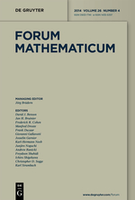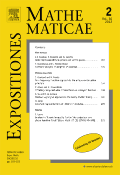
Notes on Number Theory and Discrete Mathematics
Scope & Guideline
Connecting Ideas to Shape the Future of Mathematics
Introduction
Aims and Scopes
- Number Theory:
The journal emphasizes research in number theory, exploring properties and relationships of integers, prime numbers, and various number-theoretic functions. - Discrete Mathematics:
The scope includes combinatorial aspects, graph theory, and algorithms, addressing problems related to finite structures and their applications. - Algebraic Structures:
Research on algebraic concepts such as groups, rings, and fields, particularly in relation to number systems and polynomial equations. - Sequences and Series:
Significant focus on the study of numerical sequences and series, including Fibonacci and Lucas sequences, and their generalizations. - Diophantine Equations:
Investigations into integer solutions of polynomial equations, with a particular emphasis on methods for finding and analyzing such solutions. - Arithmetic Functions:
The journal covers research on various arithmetic functions, their properties, and applications in number theory. - Generating Functions:
The use of generating functions as a tool for solving problems in combinatorics and number theory is a consistent theme in the journal.
Trending and Emerging
- Generalized Sequences:
There is a notable increase in research on generalized sequences, including various extensions of Fibonacci and Lucas numbers, which indicates a trend towards exploring broader classes of sequences. - p-Adic Analysis:
A rising interest in p-adic numbers and their applications in number theory is evident, with several recent papers addressing p-adic functions and their properties. - Computational Techniques:
Emerging methodologies that leverage computational approaches to solve complex problems in number theory and discrete mathematics are increasingly prominent, showcasing a blend of theoretical and practical work. - Hybrid Numbers and Quaternions:
Research into hybrid numbers and quaternionic extensions of classical sequences is trending, indicating a growing fascination with algebraic structures beyond traditional integers. - Applications of Number Theory in Cryptography:
The intersection of number theory and cryptography is gaining attention, with papers exploring how number-theoretic concepts can be applied to cryptographic systems.
Declining or Waning
- Geometric Properties:
Research articles focusing on geometric aspects of number theory, such as geometric representations of sequences, have become less frequent, indicating a potential shift towards more abstract or algebraic approaches. - Classical Number Theory:
Traditional topics in number theory, including elementary results and classical problems, appear to be waning as the journal increasingly highlights more advanced and specialized areas. - Combinatorial Identities:
While still present, the exploration of classical combinatorial identities and their proofs has seen a decline in favor of more complex and generalized formulations. - Graph Theory Applications:
Research applying discrete mathematics to graph theory has diminished, with fewer papers exploring classical graph problems or properties compared to previous years.
Similar Journals

PUBLICATIONES MATHEMATICAE DEBRECEN
Charting the Course of Mathematical ExcellencePublicationes Mathematicae Debrecen is a renowned international journal published by the University of Debrecen, Institute of Mathematics, situated in Hungary. This journal, with both ISSN 0033-3883 and E-ISSN 2064-2849, has established itself in the field of mathematics since its inception, with coverage extending from 1997 to 2024. Recognized for its rigorous academic standards, it currently holds a Q3 ranking in the mathematics (miscellaneous) category for 2023 and ranks at the 42nd percentile among general mathematics journals in Scopus. Publicationes Mathematicae Debrecen aims to disseminate high-quality research across various areas of mathematics, contributing to the advancement of knowledge and practice in this dynamic field. Although it is not an open-access journal, its readers can access a wealth of scholarly work that addresses both theoretical and applied mathematical issues, making it an invaluable resource for researchers, professionals, and students alike.

Journal of Integer Sequences
Diving Deep: Your Source for Cutting-edge Integer Sequence ResearchJournal of Integer Sequences, published by University of Waterloo, stands as a vital resource within the field of Discrete Mathematics and Combinatorics. This open-access journal, which has been in circulation since 1998, is dedicated to the study and dissemination of research concerning integer sequences, a fundamental aspect in various mathematical disciplines. With a current impact factor reflected by its Q3 ranking in the 2023 category of Discrete Mathematics and Combinatorics, the journal enhances its visibility through a dedicated approach to scholarly excellence and engagement with cutting-edge research. Positioned in Canada, the journal encourages contributions from researchers, professionals, and students alike, fostering a collaborative environment where innovative mathematical ideas can flourish. Explore the depths of integer sequences and their applications by accessing this journal for vital insights and advancements in the field.

Discrete Analysis
Championing Rigorous Research in Discrete DisciplinesDiscrete Analysis, published by ALLIANCE DIAMOND OPEN ACCESS JOURNALS, is a pioneering open access journal that has been contributing to the fields of Algebra, Number Theory, Discrete Mathematics, Combinatorics, Geometry, and Topology since its inception in 2016. Based in the United Kingdom, this journal is highly regarded, holding a prestigious Q1 ranking across key mathematical disciplines as of 2023, which underscores its influence and reputation within the academic community. With rigorous peer-review standards and an accessible platform, Discrete Analysis is dedicated to disseminating high-quality research that fosters advancements in mathematical theory and application. By embracing the open access model, the journal ensures that scholarly work is readily available to researchers, professionals, and students alike, promoting greater collaboration and innovation in mathematical research. For up-to-date insights and contributions in the field, Discrete Analysis is an essential resource.

ACTA ARITHMETICA
Unveiling new horizons in mathematical research.ACTA ARITHMETICA, published by the Polish Academy of Sciences Institute of Mathematics - IMPAN, serves as a prominent platform for the field of Algebra and Number Theory, showcasing significant advancements and novel research findings. With an ISSN of 0065-1036 and an E-ISSN of 1730-6264, this esteemed journal, based in Warsaw, Poland, has established itself within the academic community since its inception in 1996. Ranking in the Q2 category for Algebra and Number Theory in 2023, and positioned at #78 among 119 peers according to Scopus metrics, ACTA ARITHMETICA is dedicated to disseminating rigorous mathematical research, thereby fostering scholarly dialogue and innovation. Although the journal does not currently offer open access options, its wide readership ensures that research published within its pages reaches a global audience. With a commitment to excellence in mathematical exploration, the journal remains an essential resource for researchers, professionals, and students eager to stay at the forefront of this dynamic field.

Discrete Mathematics Letters
Fostering collaboration in the world of mathematics.Discrete Mathematics Letters is a prominent open-access journal dedicated to advancing the field of Discrete Mathematics and Combinatorics, published by Shahin Digital Publisher. Since its inception in 2019, this journal has rapidly established its presence in the academic community, securing a respectable Q2 category ranking in the 2023 Scopus database, positioning itself at rank #45 out of 92 in its field, making it a valuable resource for researchers and practitioners alike. With a commitment to disseminating high-quality research, Discrete Mathematics Letters provides an accessible medium for sharing innovative ideas and findings within the mathematical sciences, ensuring that researchers, students, and professionals stay informed about the latest developments. As an open-access journal, it provides free access to publications, fostering collaboration and knowledge exchange among the global research community.

RAMANUJAN JOURNAL
Fostering groundbreaking research in mathematics.The Ramanujan Journal, published by Springer, is a premier academic journal dedicated to advancing research in the fields of Algebra and Number Theory. With an ISSN of 1382-4090 and an E-ISSN of 1572-9303, this journal has established itself as a vital platform for disseminating high-quality research from 1997 through 2024. The 2023 category quartiles rank it in Q1 for Algebra and Number Theory, reflecting its rigorous selection standards and significant impact in the mathematics community, evidenced by its Scopus rank of 53 out of 119 in its category. Although it does not currently offer open access, the journal is pivotal for researchers and professionals seeking to engage with cutting-edge advancements and comprehensive studies in these mathematical disciplines. The Ramanujan Journal represents a critical resource for students and scholars alike, fostering a deeper understanding and innovative exploration of algebraic and number-theoretical concepts.

Contributions to Discrete Mathematics
Pioneering insights in combinatorial research.Contributions to Discrete Mathematics, published by the Department of Mathematics and Statistics at the University of Calgary, serves as a vital platform for disseminating innovative research within the dynamic field of discrete mathematics and combinatorics. Established in 2008, this journal has rapidly gained recognition, currently holding a Q3 classification in discrete mathematics and combinatorics for 2023. As it aims to foster academic dialogue and share groundbreaking discoveries, the journal showcases high-quality peer-reviewed articles that cover a range of topics, from theoretical explorations to practical applications. Although it currently operates under a traditional subscription model, there is a growing commitment to enhancing access options, ensuring that critical knowledge is available to researchers and practitioners alike. With its notable Scopus ranking of #50 out of 92 within its category, this journal is positioned as an important resource for students, academics, and industry professionals who seek to stay at the forefront of discrete mathematics research.

FORUM MATHEMATICUM
Championing Rigorous Analysis and Methodologies in MathematicsFORUM MATHEMATICUM, published by WALTER DE GRUYTER GMBH, is a distinguished academic journal based in Germany, known for its significant contributions to the field of mathematics. With an ISSN of 0933-7741 and an E-ISSN of 1435-5337, the journal features comprehensive studies ranging from applied mathematics to diverse mathematical disciplines. Having maintained a commendable presence since 1989, FORUM MATHEMATICUM has achieved notable classification rankings, including Q2 in Applied Mathematics and Q1 in miscellaneous Mathematics as of 2023. Additionally, it holds a Scopus rank within the top 60th percentile in General Mathematics, making it a prominent platform for researchers and professionals seeking rigorous analysis and innovative methodologies in mathematics. While the journal does not currently offer open access, its rich content is pivotal for advancing mathematical theory and applications, appealing to students and seasoned academics alike.

EXPOSITIONES MATHEMATICAE
Fostering Original Research in Diverse Mathematical FieldsEXPOSITIONES MATHEMATICAE, published by Elsevier GmbH, stands as a significant journal in the realm of mathematics, catering primarily to researchers, professionals, and students. With an ISSN of 0723-0869 and an E-ISSN of 1878-0792, this journal has made its mark in the academic community, boasting a Q2 classification in the miscellaneous mathematics category for 2023, illustrating its prominence within its field. The journal addresses a diverse scope of mathematical topics, encouraging the publication of original research and innovative theories while maintaining rigorous academic standards. As it converges from 2004 to 2024, EXPOSITIONES MATHEMATICAE continues to be an essential resource for advancing mathematical knowledge and fostering scholarly communication, despite being a non-open-access publication. Its location in Munich, Germany further anchors it within a rich intellectual tradition, providing accessibility for the mathematical community worldwide.

Advanced Studies-Euro-Tbilisi Mathematical Journal
Fostering Innovation in Mathematical ResearchAdvanced Studies-Euro-Tbilisi Mathematical Journal, published by the esteemed TBILISI CENTRE MATH SCI, is a vital resource for scholars and practitioners in the field of mathematics. Since its inception in 2021, this journal has committed to advancing knowledge across various mathematical disciplines, including Algebra and Number Theory, Analysis, Applied Mathematics, and Geometry and Topology, although it currently holds a category quartile ranking of Q4 in all these areas. With an open-access format, it provides unparalleled access to cutting-edge research to a global audience of researchers, professionals, and students, fostering collaboration and innovation within the mathematical community. Operating from TBILISI, Georgia, the journal acknowledges the growing importance of diverse geographical contributions to mathematics and aims to spotlight emerging research trends. As research continues to evolve, Advanced Studies-Euro-Tbilisi Mathematical Journal seeks to enrich the academic dialogue and support the dissemination of mathematical knowledge.